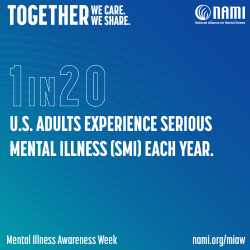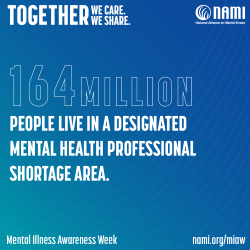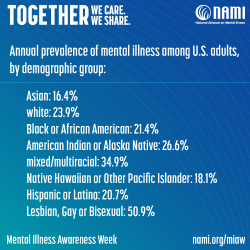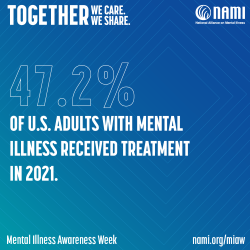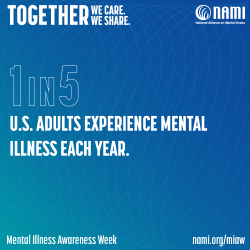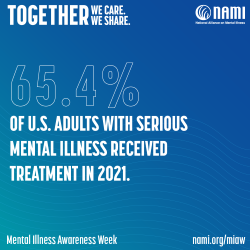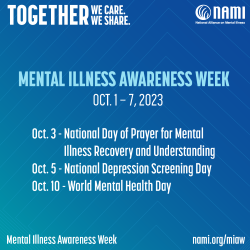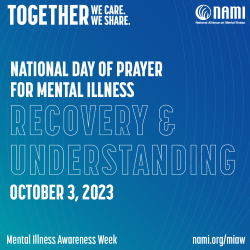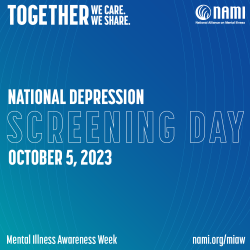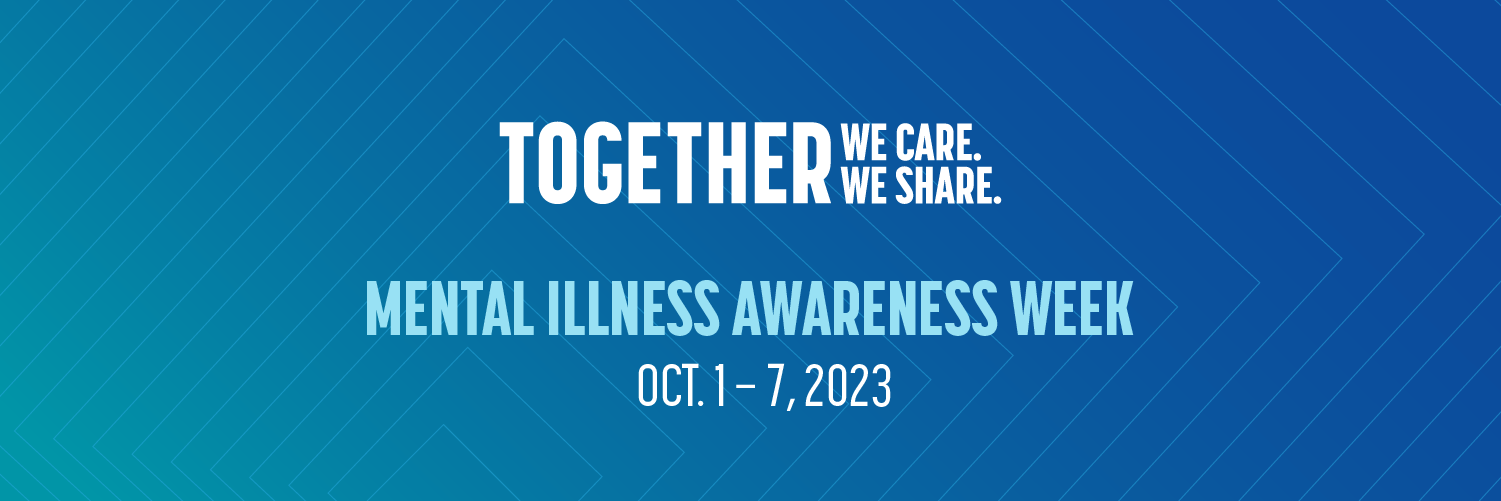
Mental Illness Awareness Week
Each year, millions of Americans face the reality of living with a mental health condition. However, mental illness affects everyone directly or indirectly through family, friends or coworkers. That is why each year, during the first week of October, NAMI and participants across the country raise awareness of mental illness, fight discrimination and provide support through Mental Illness Awareness Week (MIAW).
We believe that mental health conditions are important to discuss year-round, but highlighting them during MIAW provides a dedicated time for mental health advocates across the country to come together as one unified voice. Since 1990, when Congress officially established the first full week of October as MIAW, advocates have worked together to sponsor activities, large or small, to educate the public about mental illness.
Jump To:
MIAW 2023
This year’s MIAW will center the theme “Together We Care. Together We Share.” This campaign speaks to the impact of NAMI’s support resources. It conveys the power of coming together in community, which can be healing as people gather to share their experiences. Our hope is that, through this campaign, we can spread awareness of two of NAMI’s major support resources: NAMI Support Groups and the new NAMI Teen and Young Adult HelpLine.
How To Engage Online With MIAW
Promote NAMI Support Groups
Share our promotional materials with your networks and get the word out about NAMI’s free support groups.
During Mental Illness Awareness Week, please refer to these images and graphics you can use on your website and social media accounts.
Promote The NAMI Teen And Young Adult HelpLine
The new NAMI Teen & Young Adult (T&YA) HelpLine offers a direct connection with another young person who shares similar experiences and is prepared to offer information, resources, and support to help you or someone you know move through difficult times to a better place.
Order NAMI’s First Book: “You Are Not Alone”
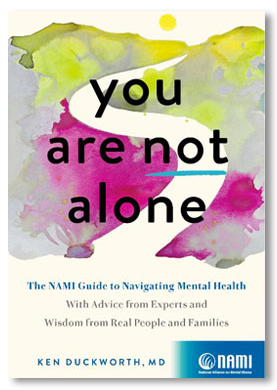 Mental health affects us all and everyone should have the right to be heard and healed without shame or judgment. Bebe Moore Campbell was committed to creating safe spaces for people in communities of color to connect with others who share similar experiences and cultural backgrounds. These safe spaces served as a gateway to vital mental health resources and support networks.
Mental health affects us all and everyone should have the right to be heard and healed without shame or judgment. Bebe Moore Campbell was committed to creating safe spaces for people in communities of color to connect with others who share similar experiences and cultural backgrounds. These safe spaces served as a gateway to vital mental health resources and support networks.
This July — and beyond — we’re not only honoring Bebe Moore Campbell’s legacy, but continuing it by empowering, uplifting and elevating historically underrepresented communities in their mental health journeys, while eradicating stigma and elevating communities.
Help us honor Bebe Moore Campbell. Join us during Minority Mental Health Month and use your voice and share your story as we fearlessly reshape mental health conversations and eliminate the systemic barriers that impact communities of color. Together, let us forge a path of lasting change and empowerment.
Order your copy of the book today or for bulk purchases, visit Porchlight- You Are Not Alone.
Share MIAW Video Series
Please check out our library of spots available for your use here.
Share Key Fast Facts
- 1 in 5 U.S. adults experience mental illness each year
- 1 in 20 U.S. adults experience serious mental illness (SMI) each year
- 1 in 6 U.S. youth aged 6-17 experience a mental health disorder each year
- Annual prevalence of mental illness among U.S. adults, by demographic group:
- Non-Hispanic Asian: 16.4%
- Non-Hispanic white: 23.9%
- Non-Hispanic Black or African American: 21.4%
- Non-Hispanic American Indian or Alaska Native: 26.6%
- Non-Hispanic mixed/multiracial: 34.9%
- Non-Hispanic Native Hawaiian or Other Pacific Islander: 18.1%
- Hispanic or Latino: 20.7%
- Lesbian, Gay or Bisexual: 50.9%
- Annual prevalence among U.S. adults, by condition:
- Major Depressive Episode: 8.3% (21 million people)
- Schizophrenia: <1% (estimated 1.5 million people)
- Bipolar Disorder: 2.8% (estimated 7 million people)
- Anxiety Disorders: 19.1% (estimated 48 million people)
- Posttraumatic Stress Disorder: 3.6% (estimated 9 million people)
- Obsessive Compulsive Disorder: 1.2% (estimated 3 million people)
- Borderline Personality Disorder: 1.4% (estimated 3.5 million people)
- 47.2% of U.S. adults with mental illness received treatment in 2021
- 65.4% of U.S. adults with serious mental illness received treatment in 2021
- Annual treatment rates among U.S. adults with any mental illness, by demographic group:
- 164 million people live in a designated Mental Health Professional Shortage Area
Advocate
Join our movement to advocate for a better mental health care system by signing up for advocacy alerts and taking action when opportunities arise in your community.
Blogs and Personal Stories
Blogs
View All >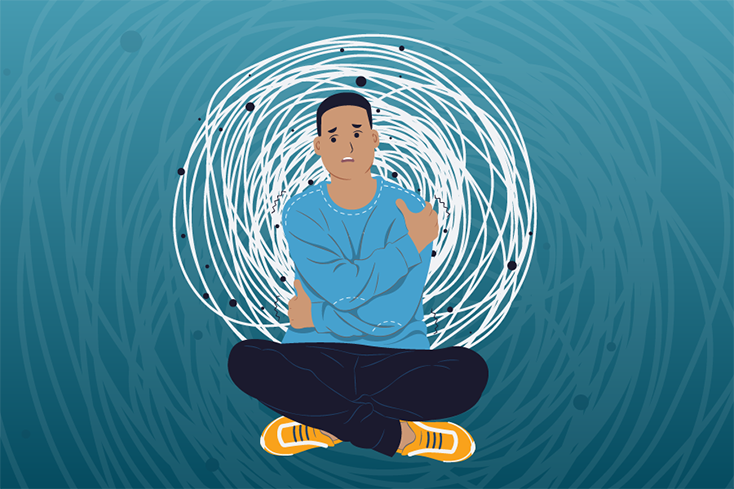
From Gang Member to Mental Health Advocate
Read More >Personal Stories
View All >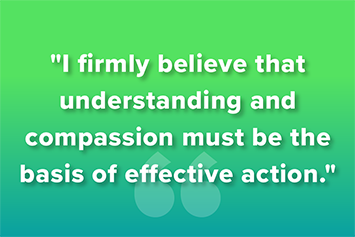
The Blizzard of Depression and the Importance of Compassion
Read More >